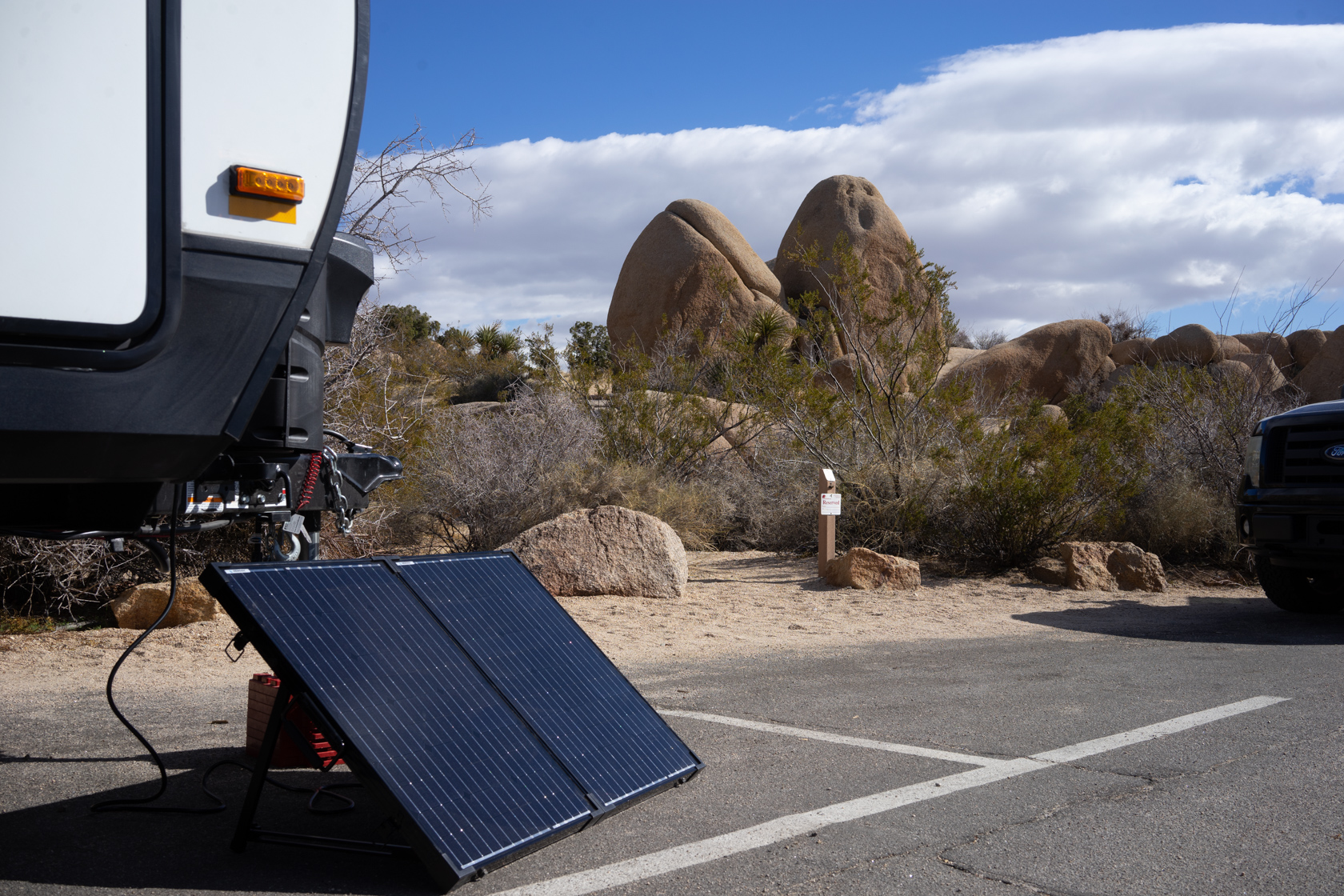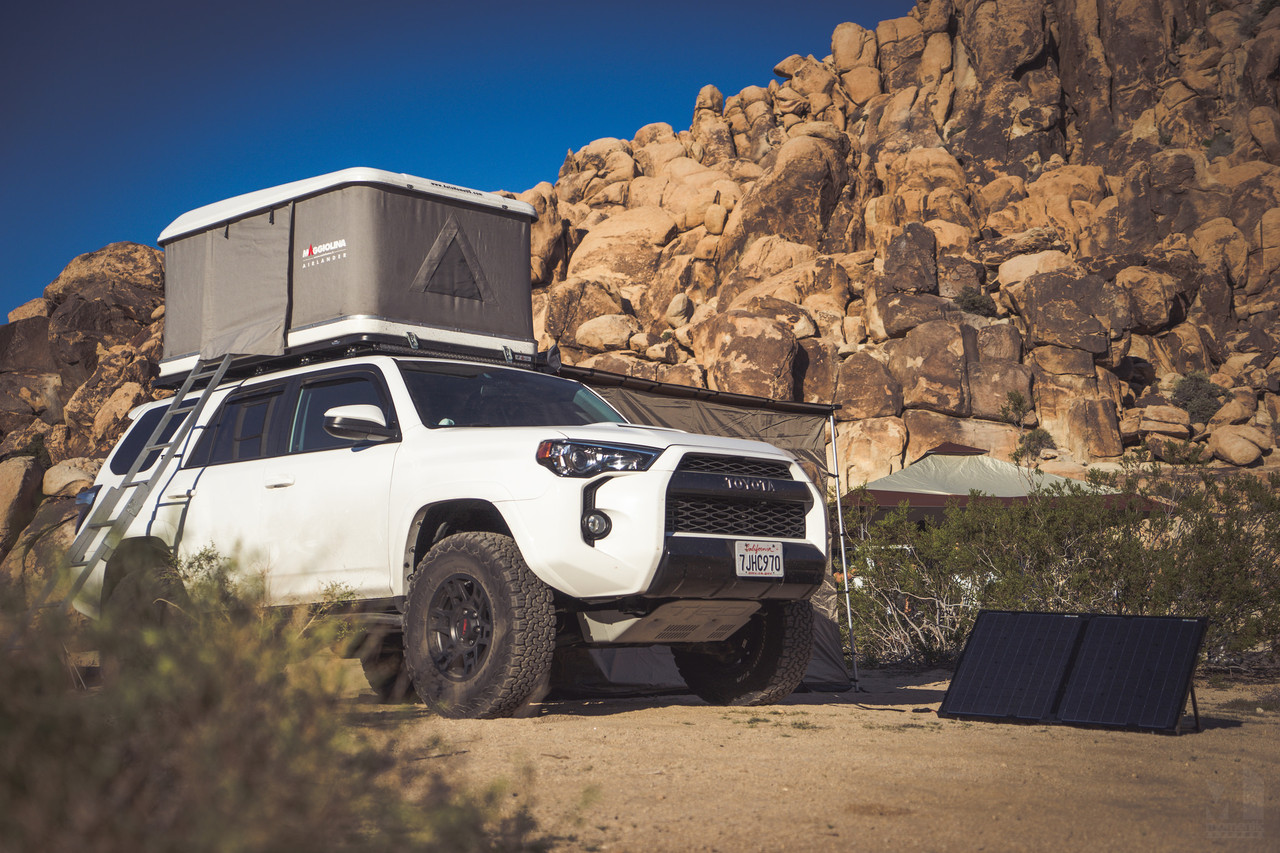What are the best solar panels for camping?
Camping in the outdoors is great fun and an opportunity to tune out the noise and pressures of city living.
But many modern campers don't want to disconnect completely; they still want their phones for safety or to recharge cameras and capture unforgettable moments. That's why campers can benefit from a portable power source, even when you're going off-grid.
Camping solar panels and chargers are now much more affordable and come in various sizes so that you can charge everything from a mobile phone up to an entire van conversion. Whatever your end-use case, you can get a quality source of power for your next wilderness or festival camping trip.
Types of Camping Solar Panels
Solar panels and portable chargers come in all shapes and sizes. Finding the right solar panel can often be a challenge. Your use case will determine the best camping solar panel for you.
If you want to keep a phone or small device charged while backpacking, you'll only need a small solar charger. But, if you're going to power appliances in a van or camper, you'll need panels with more energy output. Here are some of the popular types of camping solar panels.
Solar Chargers
A solar charger employs solar energy to supply electricity to devices or batteries. They can be as compact as a mobile phone or as large as a table, and are generally portable. Solar chargers, also known as "portable generators," are a great energy option for backpackers and hikers because they fit easily into backpacks.
Small portable solar chargers act like battery banks and are great for backup power for small electronics. The Renogy 15,000maH is a high quality and practical choice for a solar charger because it also has a built-in battery bank. Many other top-ranked solar chargers on the market don't have this feature. This solar power bank is ideal for charging small devices like smartphones.
Portable Solar Panels
Portable solar panels are an excellent option for backpacking or moving around. Portable solar panels are usually foldable solar panels, also known as "folding solar suitcases." These panels can still be quite large, but they can still be quickly folded for storage or transport. With portable solar panels, you don't have to install panels to the roof of your vehicle permanently; you can take your panels out when you're stationary and adjust their position to best catch the sunlight.

Fixed Mounted Solar Panels
Fixed or rigid solar panels are best suited for use when camping with motorhomes and campervans. These fixed mounted solar panels are the most common type of panel available on the market. Fixed solar panel kits can be attached and utilized to almost all applications with flat surfaces, including caravans. If you take longer holidays in your camper or want to live off-grid then this could be a good option.

Flexible Solar Panels
Flexible panels are not only thinner than traditional rigid solar panels but are more lightweight. These panels are made of highly durable polymer material and can be mounted flush onto non-flat surfaces. This style of flexible solar panel is another great option for generating power for your caravan or vehicle while camping. However, don't mistake "flexible" for "foldable"; these panels can't be folded into a backpack.

How to Choose Solar Panels for Camping
When choosing the best solar panels for camping, you'll need to consider your set-up, how much power you need for your devices, and how much sunlight you will be exposed to.
Camping in a caravan or motorhome is very different from camping with a backpack, and vehicles typically come with more appliances and devices. Therefore, solar panel set-ups for caravans are typically bigger and more sophisticated than the small portable chargers used by backpackers.
Backpackers camping in tents have more limitations in the size and weight of the solar panels they can carry with them. While you can attach a solar charger to your backpack and charge on the go, your available power output is usually much lower with a portable backpacking solution.
Camping in a van or motorhome will provide more options to mount solar panels and generate energy throughout the day; this allows you to power bigger appliances.
If you're camping for several days and know the weather isn't going to be very sunny (and let's face it, this is Britain), then it's beneficial to choose a solar panel with a battery so you can store solar energy. Using a battery alongside your solar panel provides more flexibility and freedom. You can go hiking or explore for the day and leave your solar panel and battery to charge at your campsite or in a location with more sun exposure.
How many solar panels do I need for an RV?
If you're camping or staying in a caravan, solar panels make a great alternative to noisy and expensive petrol generators. How many solar panels you need for a van or camper will depend on your energy usage and lifestyle.
Upgrading your motorhome or camper with solar power requires some research and planning. Work out how much solar power you need for your appliances. This number will determine how many panels you need and what size. You can then use our solar panel calculator to estimate your campervan’s daily power consumption.
Once you've worked out your consumption, you can determine how many solar panels you need. If you want to use many appliances in your van or camper, you may need to invest in additional battery storage. Plastering the roof of your vehicle with solar panels won't be effective if you can't store the excess energy the panels produce.
How to Set Up the Solar Panels When Camping
The set-up of your solar panels is essential to maximize sunlight and generate as much energy as possible during daylight hours. When you're stationary, set your solar panels out in a position where they can get the maximum benefit from the sun.
The sun is the strongest at noon, so if possible, get your panels set up in the early morning so they can catch the rays through the peak of the day. If you're stationary at your campsite, adjust the position throughout the day to follow the full sun.
If you're hiking or moving around, you can also attach smaller panels to backpacks to capture sunlight as you're on the go.
Conclusion
When heading out into the wilderness, the modern camper wants to keep some electronics charged, whether it's for convenience or emergencies. Solar power gives you a reliable, green energy source that lets you head off for days at a time, knowing you can safely keep devices charged.
Unlike traditional generators, portable solar power is quiet and safe. There is no buzzing noise ruining your peace and no hazardous fumes from petrol or diesel. A solar charger or solar panels is an excellent addition to your camping gear. Once you add solar power to your pack, you'll never look back.
Resources
https://ecotality.com/best-solar-panels-for-camping/
https://www.beyondthetent.com/best-portable-solar-panels-for-camping/







